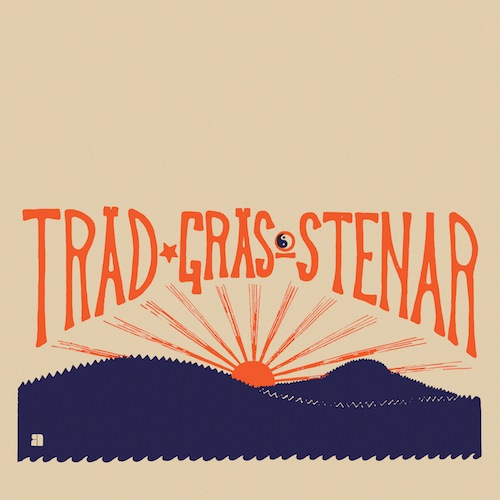At the beginning of BBC 4’s excellent documentary Krautrock: The Rebirth Of Germany, the members of Amon Düül spoke of growing up after the second world war, when there were still "bloody Nazis around all over the place" (parents, teachers, judges, "all [kinds of] people") and how this fuelled their desire to create a completely new style of music that would be indebted neither to Anglophonic or German traditions.
It wasn’t called a world war for nothing and the need to begin again from scratch was not confined to countries as central to the conflict’s maelstrom as Germany. Indeed, avant-garde and experimental music flourished in the late 60s and early 70s in all sorts of locations, not least in Sweden, which had remained neutral during World War Two, though hardly in a condition of tranquil isolation. Sweden had traded with both Britain and Germany (including the extensive export of the iron ore so precious to Hitler’s weapons industry), provided arms, supplies and thousands of volunteer soldiers to Finland when it was attacked by the Soviet Union in November 1939, and was pressured into allowing the secret transportation of Nazi troops through its territory. It also took in more than 50,000 Norwegian refugees and provided asylum for almost all of Denmark’s Jews.
After such turbulence, you can see why Sweden’s young natives, too, might have the harboured urge to rip it up and start again. If Sweden can be said to have had its own equivalent of Amon Düül, then it is Träd, Gräs Och Stenar (or Trees, Grass And Stones) who, formed from the ashes of Bo Anders Persson, Torbjörn Abelli, Arne Ericsson and Thomas Mera Gartz’s previous outfit Pärson Sound, were one of the leading lights of the Swedish "progg" scene (which is not to be confused with English progressive rock). As Jim Weir noted in issue 287 of The Wire, Sweden at the end of the 60s, with its "polity grounded in welfare liberalism and sufficiently unawed by the Soviet Union to welcome anarchist and libertarian politics like nowhere else in Europe" had become "a mecca for draft-dodgers, bail-jumpers and other square pegs". Community, DIY culture, audience participation and live performance were all central to Träd, Gräs Och Stenar’s unwritten manifesto. The band are known for having performed better in concert than on record, and this set compiles the group’s superb live albums, Djungelns Lag and Mors Mors, which documented their gigs around Scandinavia in the early 70s, along with extra bonus bits including a whole new disc of previously unreleased live treasures from 1972.
Träd, Gräs Och Stenar cannot be said to have been quite as staunchly averse to Anglophonic influence as many a Krautrock outfit because they were sufficiently enamoured to cover well-known songs by Bob Dylan and the Rolling Stones. Having said that, these were radical remouldings, as indebted to the repetitious compositions of Terry Riley as the original chart hits themselves. This collection includes two renditions of ‘Last Time’ by the Rolling Stones. The first is nine minutes long, the second is almost twice that length, and each one acts as a glorious example of how a group can bend, twist and, most of all, stretch another act’s song into a barely-recognisable creative reclamation. Let’s not dwell on the ‘Stones, though. This isn’t Paul Gambaccini’s radio hour. Träd, Gräs Och Stenar’s original pieces are even more fun, ranging from two-minute acoustic fireside chants to full-bore half-hour psych-rock improvisations. Their expressive jams are not exercises in solipsistic virtuosity, like a great deal of the Grateful Dead’s shaggy noodling, and they are more free-folky than, say, Crazy Horse’s proto-metal amplifier worship. You can see why Stephen Malkmus is such a fan (he’s called them "one of the best heavy-psych-improv-folk-blues-rock bands ever"). His old band, Pavement, were at their best when at their most ramshackling, while some of his work with The Jicks, especially 2008’s Real Emotional Trash, has dealt in loose ‘n’ lengthy wig-outs. It’s a shame that Malkmus can’t combine the two more effectively and be a little more reliably "progg", to be honest.
There are parallels, echoes and premonitions of all sorts of bands in the music of Träd, Gräs Och Stenar, from contemporaries like Amon Düül, Popul Vuh and Faust in Germany, the Matrix Tapes-era of New York’s Velvet Underground and British psych-folk oddballs like The Incredible String Band, to the more recent emancipated explorations of the ‘New Weird America’ scene, such as Jackie-O Motherfucker, No-Neck Blues Band, Excepter and the countless psych and freak-folk groups that have thrived in their wake.
Altogether, there’s about five hours of material here and, even with our attention spans now ravaged by social-media scrolling and instant online gratification, this thorough compilation simply does not get boring at any point. At the risk of getting all dewy-eyed and nostalgic for a time before I was even alive, a lot of wonderful, positive and progressive things happened in those post-war years, culturally, socially and politically; ideas, policies and practices which have since been incessantly contaminated, corrupted, appropriated, privatised and plundered. The constant barrage of documentaries, books, articles and reissues from rock’s nostalgia industry has become so suffocating of late that you might wish to never hear anything else about the 60s and 70s ever again, especially no more about the baby boomers’ go-to canon of Jagger, Richards, Dylan, Lennon, Morrison and the rest. Then something more unusual and exotic like this rambunctious collection comes along and, yes, you might catch yourself thinking, "blimey, what a time to be alive."


